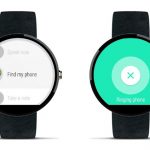Android pisses all over Apple -- in Google Maps [Updated]

Google hides lots of Easter eggs in its products and services. Usually fun little extras designed to amuse. However, the latest one discovered in Google Maps is of questionable taste.
Tucked away in Pakistan, close to the New Islamabad International Airport, is a cartoon image of Google’s Android urinating on an Apple logo. Nice.
Send directions from your desktop to Google Maps on your Android phone

Dedicated satnav units are less popular than they used to be, and this can be attributed in part to the rise of direction-providing smartphone apps like Google Maps and Waze. If you are invested in Google Maps, you may well check out directions on your desktop computer and then have to get them set up on your phone as well.
Today that changes. Google has unveiled a feature that makes it possible to push directions from your desktop computer or laptop to your phone. This eliminates a step and makes the whole process of getting from A to B much easier.
Celebrate YouTube's 10th anniversary by going back to where it all began -- the zoo

Google’s video service celebrates a very special milestone today -- it’s ten years to the day since the first video was uploaded to the site. "Me at the Zoo", in all its 240p glory, has racked up close to 20 million views, which isn’t bad (especially as it wasn’t made public initially), although it pales into insignificance when compared with the likes of "Charlie Bit My Finger -- Again", with its 817 million views.
A lot has happened to YouTube in that time. It officially launched in May 2005 (so expect another birthday post next month) and was acquired by Google in 2006. It has spread across a wide range of platforms, batted off numerous legal challenges, and become a massive part of our lives.
What if Apple buys Nokia's HERE?

It is no secret that Nokia is pondering the sale of its HERE division. The Finnish company wants to focus on the telecommunications market, and HERE, which offers location services, mapping and navigation software, seems to be nothing but extra weight to lug around. Seeing as a sale is inevitable, the question is, who is going to buy it?
A rumor that's floating around now suggests that Nokia has pitched the sale of HERE to Apple, among other companies. The Cupertino, Calif.-based corporation would certainly stand to benefit from acquiring the technology that powers HERE, as its own attempt at offering navigation software to iOS users has not gone particularly well. Such a purchase, while extremely interesting for Apple, would have deep implications for HERE's current clients, which will most certainly not be favored by it. Here's what it could entail.
Google Project Fi is calling -- will you answer?

The waiting begins. This afternoon I asked the great Google god to bless me with an invite. If my homage is accepted, someday soon I can pay for the privilege of using the company's new piggyback cellular phone service. The thing is so exclusive, only one smartphone is supported. It's Nexus 6, or nothing, baby. I own one, so happens.
Project Fi switches between Sprint and T-Mobile cellular networks for core connectivity alongside wireless hotspots. That's why I call it a piggyback service; Google is not building out its own infrastructure. Fi is contextually conceived and consumed. Nexus 6 switches networks based on location and availability. Your phone number traverses devices, providing access on laptops and tablets, too. Context is what differentiates this service from every other.
Safari is king of the mobile browsers -- which could be bad news for Google

Google’s dominance of the web is best illustrated by Mobilegeddon. The search giant has made changes to its algorithm, prioritizing sites that are "mobile friendly" and demoting those that aren’t. Google says that mobile-friendliness is just one of 200 signals that it uses to determine the ranking of results and that sites which don’t have mobile versions won’t disappear as a result of this change. That said, the truth is if Google says you need a mobile site -- that it approves of -- then you need a mobile site.
But while Google is forcing sites to offer mobile friendly versions or suffer the consequences, it’s Apple’s browser that the majority of people are using to access the web while on the go.
Google wants you to be quiet about 'Mobilegeddon' -- it's creating 'Mobiletopia'

When Google announced changes to its mobile search rankings, the industry gave it the nickname of "Mobilegeddon". A play on the word Armageddon, this moniker signaled the end of the world for websites that did not have a mobile-optimized site. While that is an extreme exaggeration, some websites did risk losing traffic as a result. Many webmasters found themselves in a panic.
Google, however, wants you to know that this concern is misplaced. Rather than it being a bad thing, it is a good thing, called "Mobiletopia". Even if Google's intention was to create a utopia for mobile devices, some argue that this demonstrates the search-giant is too strong and has too much control over the web. What do you think?
YouTube kills off support for older devices -- is yours affected?

YouTube has stopped supporting devices that make use of the second version of its Data API. In practice the move, which was announced more than a year ago, is forcing users to look into alternative ways of watching YouTube videos, and likely also taking many by surprise.
For those who are not familiar with it, YouTube's Data API allows developers to implement YouTube functionality into their apps. The second version is mostly used on older devices, with the list including TVs, smartphones, tablets, Blu-Ray disc players and more. Here's what you should do, if you're affected.
Download your Google search history for some amusing reading

Google collects a lot of data about its users -- a lot of data. Much of this data is used for advertising purposes but there's also a lot of data that you might want to make use of yourself... even if it's only for entertainment.
All those searches you performed when you were drunk? These are now available to download! Brace yourself for what could turn into hours of amusement -- or possibly sphincter tightening embarrassment -- as a new addition to Google History means you can grab a copy of this history for posterity, and gain some interesting stats into the bargain.
My Two months with Moto 360 [Review]

A smartwatch by any other name is compromise. The question: How much are you willing to pay, if anything, for the privilege? No matter what any manufacturer promises, battery life will never be enough, particularly when daily recharging is the minimum requirement. If you use the wristwear as prescribed, no less is demanded, regardless of the device maker. None delivers daily use without sacrificing something.
Nearly all these mini-computers on the wrist aren't smart enough. You need a phone, too. Is two of one and half-dozen of the other worth the trouble? The answer depends much on your lifestyle. If you text and drive, and can't break the habit, a smartwatch could save your life or others. If your mobile handset feels like a ball and chain, adopting glance-and-go lifestyle can liberate you. But if your smartphone is practically surgically attached, for its frequent use, you shouldn't add another tech accessory. If your phone battery often runs out, because you forget to plug in, don't multiply your troubles. If you don't wear a watch now, and haven't for years, don't bother.
Android Wear update brings always-on apps, Wi-Fi support and improved navigation

Much as Apple would like you to think otherwise, Apple Watch is yet to blow other wearables out of the water. Smartwatches are still something of an emerging technology, but Google has managed to carve out yet another niche for itself with Android Wear. Today the company unleashes an update that aims to make Android-powered watches easier to use.
The first major addition is support for always-on apps. Most Android Wear watches included support for displaying the time round the clock (sorry!) but this feature has now been expanded to other apps. If you're using your watch to get directions or follow a shopping list, you can opt to keep the relevant app active at all times. The update has more to offer too.
BuzzFeed editorial is controlled by advertisers

Advertising is unavoidable online. "Ah... but I have AdBlock Plus installed!" I hear you cry. It doesn't matter. You may not see advertising, but it still affects your online experience; this is particularly true if you are BuzzFeed reader. I'm not in the habit of criticizing others in the trade -- and I realize that I'm opening myself up for attack here -- but BuzzFeed is a site filled largely with listicles (lovely words) and churnalism (ditto), headlines sucking up to Google left, right and center.
But for all of the coffee-break-filling articles it pumps out each day, it is the articles that have been deleted that have generated more interest recently. About a week ago one BuzzFeed writer resigned after an article she wrote that was critical of Dove soap ads was pulled. BuzzFeed conducted a review, and this weekend details of the findings came out. It transpires that this is not the first time posts have been deleted because of a conflict of interest between editorial and advertising. BuzzFeed may not be a particularly influential site, but it's worrying nonetheless.
No, Microsoft isn't taking Android's future out of Google's hands -- here's why

Earlier this week, Cyanogen Inc announced that it has entered into a partnership with Microsoft to bundle some apps into its future Android-based operating system. While the companies meticulously chalked out most of the specifics of their collaboration -- and how it wouldn't much affect consumers in the coming months -- many people and even some news outlets are having a hard time understanding these facts, and have started to make bold, misleading conclusions.
Wired, for instance, believes that this tie-up between the two companies will end up taking Android’s future out of Google’s hands. I think they are wrong, and much to the contrary, I believe that this alliance will only be good for Google (and Android). Here’s why.
Google cleans up URLs in mobile search results with breadcrumbs

Google is revamping the way URLs appear in search results on mobile devices. Smaller screens have a tendency to truncate lengthier URLs, and even when this doesn’t happen diminutive screen size can make addresses difficult to read.
To combat this problem, the search giant is introducing a new breadcrumb trail presentation with a view to making the information easy to absorb at a glance. But what does this change actually mean?
Google Chrome on Windows XP support extends until the end of 2015

Believe it or not, a year has passed since Microsoft stopped supporting Windows XP. And even though the 13 year-old operating system no longer receives security updates -- at least not officially -- it is still being used by roughly 17 percent of Windows users. For some companies it is reason enough to continue to support Windows XP today, even though its maker has long left it for dead. And Google is one of them.
Six months after Windows XP support ended, Google announced that its Chrome browser would continue to be supported on the OS with "regular updates and security patches until at least April 2015". That was done in order to give its users more time to finish migrating to a newer Windows release, one that would, hopefully, be officially supported by Microsoft for many more years to come. Obviously, that hasn't gone as expected. But instead of pulling the plug, Google is now giving Chrome users on Windows XP another reprieve.
Recent Headlines
Most Commented Stories
This updated Windows 11 clone is Linux underneath and makes your old PC run faster -- get it now
The brilliant Windows 12 is everything Windows 11 isn't -- and the Microsoft OS we deserve
Microsoft releases Windows 11 25H2 ISOs
Microsoft is rolling out Windows 11 25H2
BetaNews, your source for breaking tech news, reviews, and in-depth reporting since 1998.
© 1998-2025 BetaNews, Inc. All Rights Reserved. About Us - Privacy Policy - Cookie Policy - Sitemap.